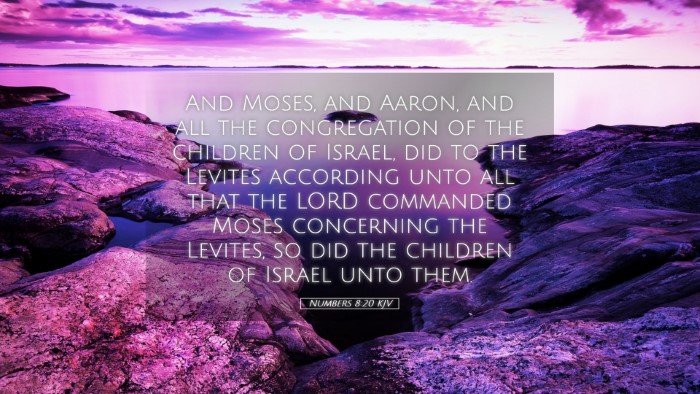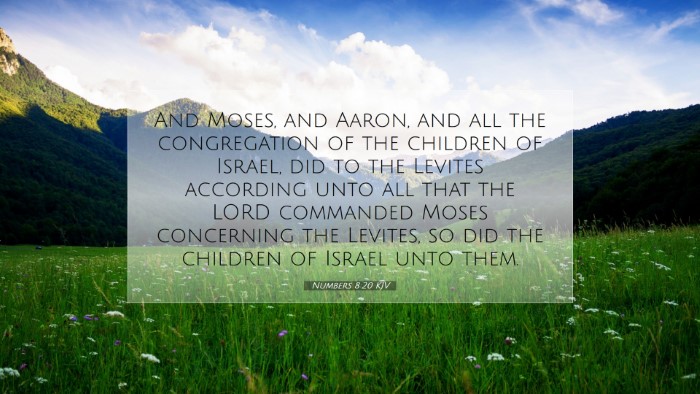Commentary on Numbers 8:20
The verse in question, Numbers 8:20, reads:
"And Moses and Aaron and all the congregation of the children of Israel did to the Levites according to all that the Lord commanded Moses concerning the Levites; so did the children of Israel unto them."
Context and Overview
This passage occurs in the book of Numbers, which is primarily concerned with the organization of the Israelite camp, the duties of the Levites, and the holiness required in their service. The Levites, designated for sacred duties, had unique responsibilities that separated them from the other tribes of Israel. This specific verse highlights the obedience of Moses, Aaron, and the entire Israelite community to God's commands regarding the Levites, marking a significant moment in the establishment of order and structure in the camp.
Insights from Public Domain Commentaries
Matthew Henry's Commentary
Matthew Henry elaborates on the theme of obedience and the importance of following divine instruction:
- Obedience to Divine Command: Henry notes that the Israelites did precisely as God commanded. This obedience is crucial in the context of their covenant relationship with Yahweh. It underscores the principle that God's commands are not optional; adherence is vital for the prosperity of the community.
- The Role of Leadership: He emphasizes the significant roles of Moses and Aaron in leading the people. Their engagement in the process of setting apart the Levites showcases a model for spiritual leadership, which involves not only guiding but also following God’s directives wholeheartedly.
- Unity of the Congregation: The mention of “all the congregation” signifies collective responsibility. It reinforces that the faith community operates best when its members are unified under the shared goal of obedience to God.
Albert Barnes' Notes on the Bible
Albert Barnes provides a detailed exposition of the organizational and ritual aspects of the Levites’ consecration:
- Consecration of the Levites: Barnes highlights that this chapter discusses the separation of the Levites for service to the Lord. The physical act of setting apart the Levites symbolizes their role in interceding for the people before God.
- Significance of the Ceremony: The detailed actions taken by the Israelites, as prescribed by God, denote the sacredness of their service. Barnes emphasizes that such rituals were both a way of acknowledging God’s holiness and a reminder of the communal nature of servitude to the Lord.
- Authority of Moses: Barnes also reflects on Moses's authority, given directly by God. His role was critical not just in leadership but also in mediating between God and His people, illustrating the important connection between divine guidance and human obedience.
Adam Clarke's Commentary
Adam Clarke offers a theological perspective on the implications of this text:
- Theological Reflection on Holiness: Clarke points out that the Levites, being set apart, represent the holiness that God demands from His servants. This reflects a broader theological truth that all believers are called to be instruments of holiness in their respective communities.
- God’s Sovereignty: Clarke emphasizes the sovereignty of God in selecting the Levites. This sovereign choice illustrates the belief that God actively directs the service and responsibilities within His people, ensuring that those called to sacred tasks are appropriately consecrated.
- Practical Implications: He discusses the practical implications of this obedience for future generations, suggesting that the principles established in this context apply to contemporary church life. The necessity for proper order, respect for sacred roles, and adherence to divine instruction remains relevant.
Application for Pastors, Students, Theologians, and Scholars
This verse, while simple in narrative, holds profound implications for various spheres of Christian life and theology. Here are some applications based on the combined insights from the commentaries:
- Emphasizing Obedience: In pastoral care and teaching, it is crucial to instill a deep sense of obedience to God's commands within the congregation, just as the Israelites demonstrated. Students of the Bible should be encouraged to explore the depth of God's instructions and their applicability in everyday life.
- Understanding Leadership: For those in leadership, this verse serves as a reminder of the importance of leading through example. Pastors should strive to embody the same obedience and commitment to God's directives, fostering a culture of accountability and unity among congregation members.
- Recognition of Holy Callings: The Levites' unique role is a reminder of the diverse callings within the church. Theologians may reflect on the significance of lay leadership and the recognition of spiritual gifts, ensuring that all members are valued in their unique contributions to the body of Christ.
- Community Responsibility: The concept of collective obedience underscores the importance of shared faith and community participation. Scholars should consider how congregational life reflects the unity demonstrated in this historical account and the implications for contemporary church governance and practices.
Conclusion
Numbers 8:20 serves as a significant illustration of obedience to God's will, the importance of proper leadership, and the holiness required in service within the community of faith. As we reflect on this passage and its implications, may we all be inspired to act with dedication and reverence towards the roles we are called to fulfill in the service of the Lord.


